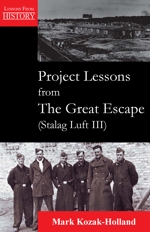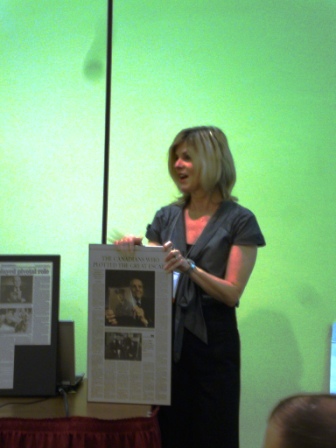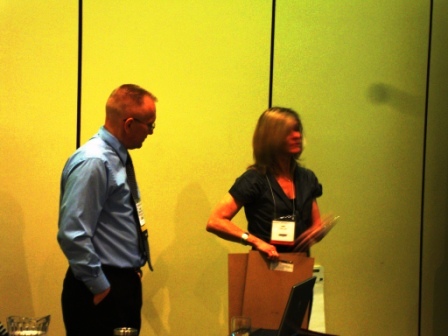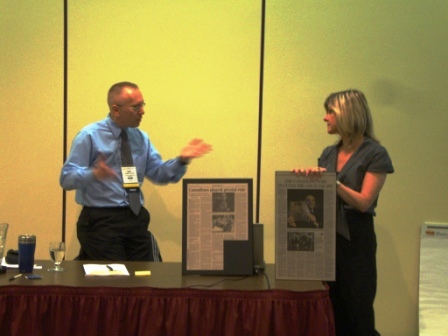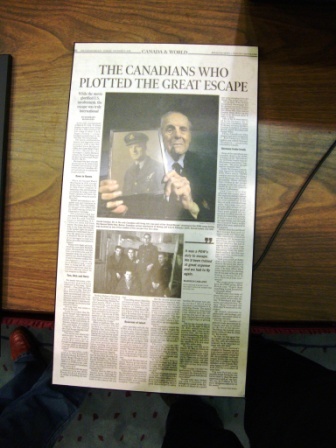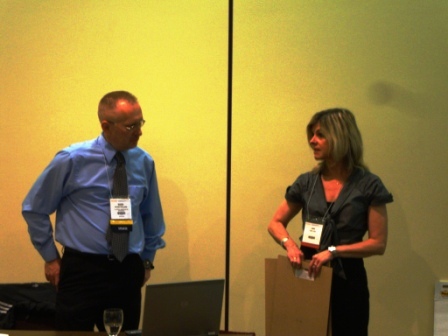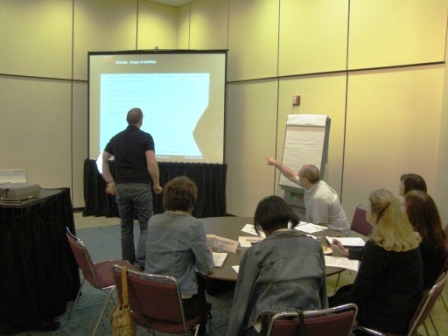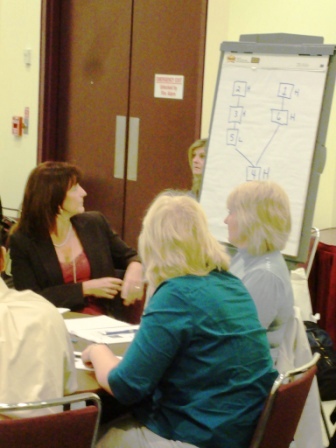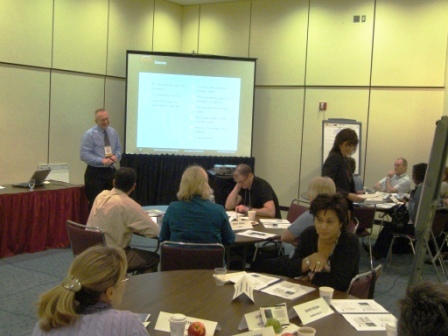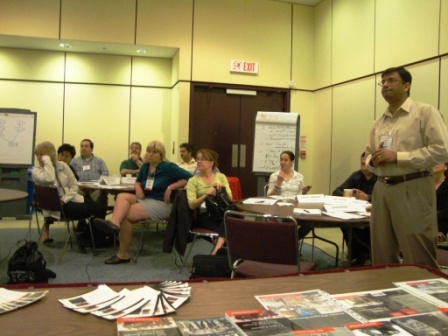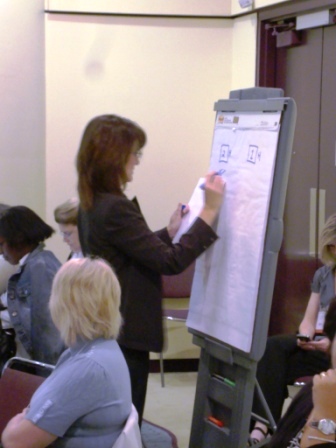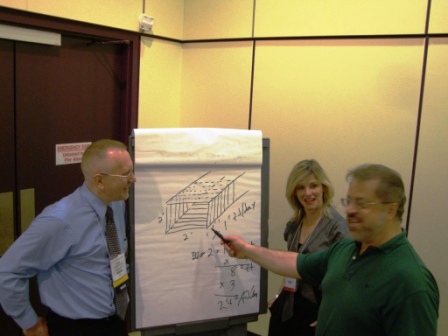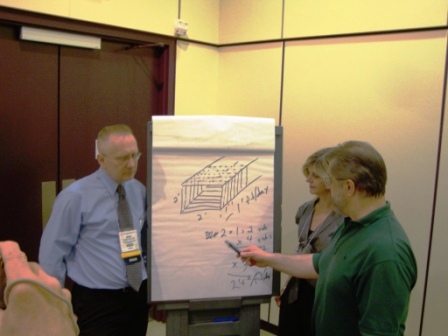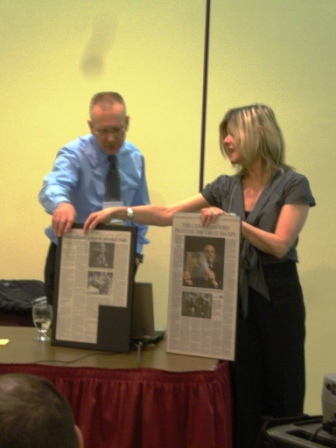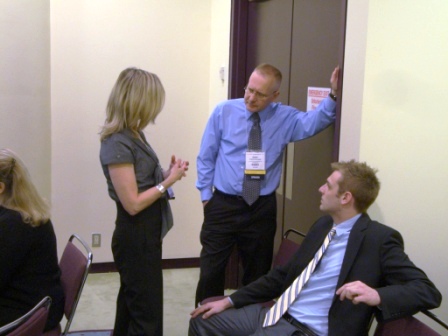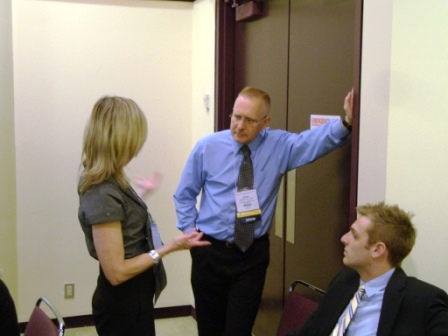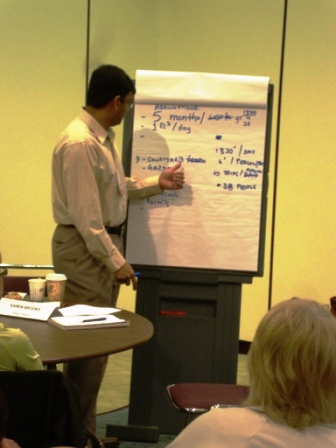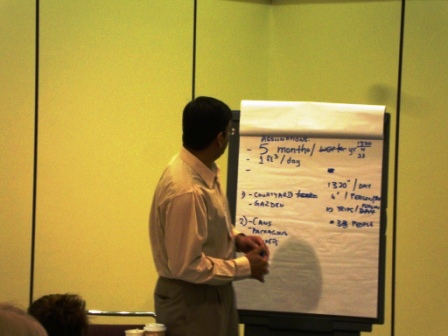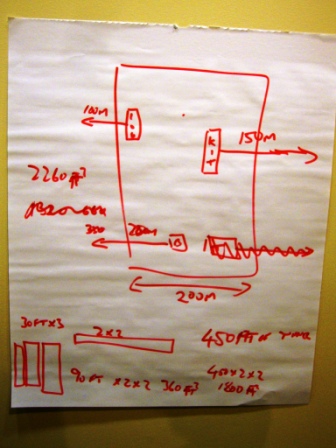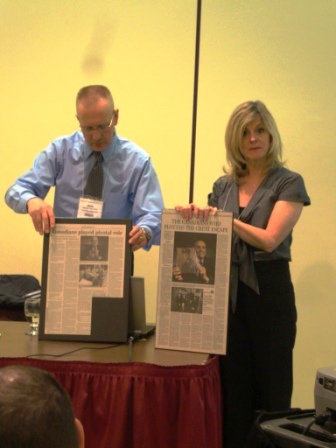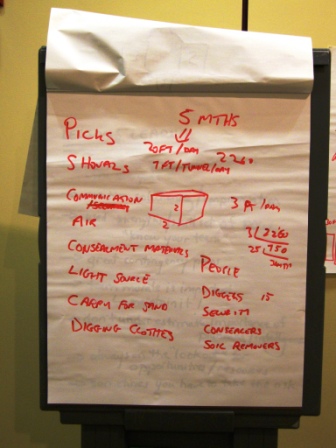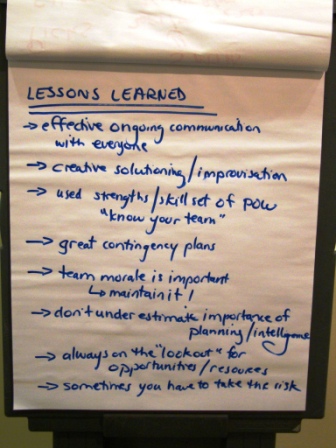LFH Overview
The Great Escape Workshop and Family Connection
Making Connections:
A Family Story Links with “Lessons from History and The Great Escape”
by Godfrey Jordan, PMP
|
Relatives of a POW survivor (Harold Garland) take part in the Great Escape Workshop at ProjectWorld (2010).
As both a past participant and a presenter, I regard the annual ProjectWorld Conference at the Metro Toronto Convention Centre as a grand opportunity to assess the current state of the business and its applications.
The event is more than just a gathering of professionals from throughout North America who network and exchange ideas as well as practical solutions to the simple yet complex art of getting things done right the first time, on time and on budget.
|
|
|
It can also be a place to make connections of a more personal kind, where a family’s history intersects with a case study reviewed through Project Management methodology. The result can be a transcending experience for all involved.
Such was the scene this past May 20, 2010 when Mark Kozak-Holland presented his “Lessons from History” workshop that examines The Great Escape as a rigorously planned and implemented project which mirrors many ‘impossible’ requirements of today’s business world. As readers well know, Mark uses historic events to illustrate Project Management Body of Knowledge (PMBOK) principles at work in dramatic fashion.
However, the presence of two particular individuals in the room gave the whole experience a unique dimension. Ann Garland is the daughter of the late Harold Garland, one of Canada’s notable WWII veterans who passed away last year at the age of 91. Along with her son Bryan, she attended the day-long workshop as special guests of the ProjectWorld organizers.
|
|
|
|
|
|
As a youngster Bryan Woodman always felt that his grandfather was somehow special. When he saw the movie “The Great Escape” and learned that his ‘Grandpa,’ Harold Garland was part of that true-life event, history suddenly became a reality, close to home.
By a series of coincidences I was able to help bring about their attendance at this workshop that day. It illustrates the consequence of being open-minded to the variety of programs offered at a conference, making literal connections, and then asking ‘why not?’
The previous year, after delivering an unrelated presentation of my own and with a two-hour block of time open, I did a quick scan of the program guide and, intrigued by the curious title “Project Management Lessons from The Great Escape,” managed to get a seat in the crowded room. Wonderfully entertaining, insightful, etc. You know the rest.
Fast forward to December 2009. I come upon a newspaper article about the passing of Harold Garland, a Canadian war vet who assisted in The Great Escape. |
|
|
|
|
|
Another fast forward, this time to April 2010. I read the upcoming ProjectWorld program and noted that it offers a day-long workshop on The Great Escape.
“Why not?” I ask myself. And then put in a call to Ann Garland, who was unfamiliar with PMBOK and the Project Management field. But she certainly knows all about The Great Escape and has met many of its participants when they visited her father.
“Why not?” I ask Mark Kozak-Holland, suggesting that Ann and her son Bryan attend the workshop as special guests. And with a phone call to co-organizer Amy Ruddell, Mark helps complete the circle.
The story included several quotes from his daughter Ann Garland, who happens to be a colleague of mine at a government agency. I called to offer condolences and mentioned how her father’s past heroics were not known to others in our office. Humility exemplified.
|
|
|
|
|
|
Bryan Woodman is now the same age as his grandfather when he went off to war and eventually became a prisoner in Stalag Luft III. The 22 year old Toronto business graduate experienced a re-telling of that historic saga in an unlikely format. “I’ve read the books, seen the films and documentaries and heard all the stories firsthand about the Great Escape, which for many people was just a movie starring Steve McQueen,” he said.
Bryan realized his undergraduate business degree gave him an extra edge to better appreciate the workshop.
“I was curious to see how Mark related the actions that culminated in The Great Escape to modern business practices. My Grandpa appreciated the logistical enormity of the plan, but I don’t think he could ever have imagined that it would be used as a learning tool for project managers. For him and the others, it was simply a matter of duty.”
Seeing these connections shed new light on the family stories which Ann Garland, while growing up, heard many times from her father and his POW friends.
|
|
|
|
|
|
“My Dad was one of the ‘penguins’, whose job it was to hide the soil dug from the tunnels, in special pouches in his trousers, and slowly walk around the prison yard to let it sift out. The trick was not to reveal this or else the guards would realize a tunnel was being constructed. When it came time to draw lots for the escape night, he was #89. Unfortunately, the 77th escapee was spotted leaving the tunnel by guards. The plot was foiled and my father didn’t get out of the camp. If he had escaped he might not have lived as Hitler ordered the execution of fifty of the recaptured POWs.” |
|
|
|
|
|
Bryan Woodman has also taken a step into public service, following his grandfather’s legacy. He was a summer intern with the Ontario government and this fall enters law school.
said David Barrett, ProjectWorld organizer and executive director of the Schulich Executive Education Center.
“This year he conducted a seven hour marathon workshop that was not only an incredible dissection of history, but it addressed the most pressing problems confronted in business operations today. How to be innovative and survive. How to draw maximum output from talented staff. Managing impossible obstacles. The parallels are all there.” |
|
|
|
|
|
Other participants in the day’s workshop said that having Ann and her son present elevated their learning experience in a remarkable way. The insights gained were enhanced by some of the commentary offered by these descendants of a survivor from that historic event in their midst.
Bryan and his mother live with that as part of their own family history. At the ProjectWorld conference, they saw how the innovative lessons from a WWII experience can remind us today that with the right set of principles and resources, nothing is impossible.
|
|
|
|
|

